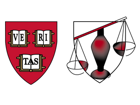Posts filed under 'Education'
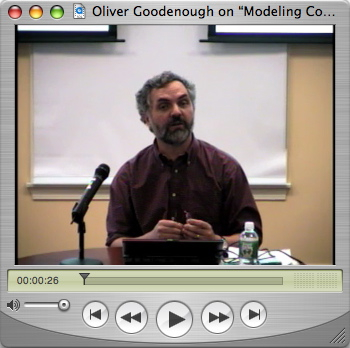
QuickTime Video
The Berkman Luncheon Series continued yesterday with Oliver Goodenough, who, in addition to being a Berkman fellow, is a Professor of Law at Vermont Law School and an Adjunct Professor at the Thayer School of Engineering at Dartmouth College.
Oliver discussed how the institution of game theory and other economic institutions can take a broad range of forms, such as conventions of property, promise keeping, truth-telling, and submission to authority, and how they can exist in a similarly broad range of milieu. Examples included the internal psychology of values and commitment, informal cultural expectations, formal institutions like law, mechanical devices like a coke machine and computer code.
You can also read David Weinberger‘s great play-by-play of the discussion and Q & A.
Please visit the Luncheon Series page to learn about future guests and be sure to RSVP to save your spot at these wonderful weekly gatherings.
Runtime: 1:07:22, size: 320×240, 184MB, .MOV, H.264 codec
October 18th, 2007
 The Berkman Luncheon Series continued yesterday with Oliver Goodenough, who, in addition to being a Berkman fellow, is a Professor of Law at Vermont Law School and an Adjunct Professor at the Thayer School of Engineering at Dartmouth College.
The Berkman Luncheon Series continued yesterday with Oliver Goodenough, who, in addition to being a Berkman fellow, is a Professor of Law at Vermont Law School and an Adjunct Professor at the Thayer School of Engineering at Dartmouth College.
 Download the MP3 (time: 1:07:08)
Download the MP3 (time: 1:07:08)
Oliver discussed how the institution of game theory and other economic institutions can take a broad range of forms, such as conventions of property, promise keeping, truth-telling, and submission to authority, and how they can exist in a similarly broad range of milieu. Examples included the internal psychology of values and commitment, informal cultural expectations, formal institutions like law, mechanical devices like a coke machine and computer code.
You can also read David Weinberger‘s great play-by-play of the discussion and Q & A.
Please visit the Luncheon Series page to learn about future guests and be sure to RSVP to save your spot at these wonderful weekly gatherings.
October 17th, 2007
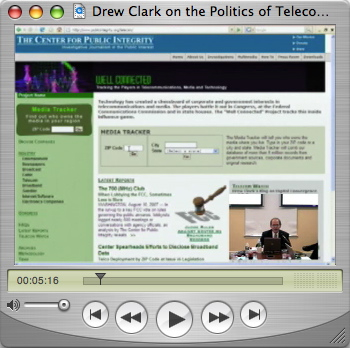
QuickTime Video
Drew Clark of the Center for Public Integrity joined an enthusiastic crowd at today’s Berkman Luncheon Series to discuss “Media Tracker, FCC Watch, and the Politics of Telecom, Media and Technology.”
Drew, a senior fellow and project manager at the Center, not only provided great insight into the difficult and confusing intersection of technology & politics, but also dove into specific examples such as, the FCC’s 700 MHz auction and the Connect Kentucky project.
For more information on Drew’s work, the Center for Public Integrity, and future luncheon guests, check out the Events & Webcast blog.
Runtime: 1:03:25, size: 320×240, 175MB, .MOV, H.264 codec
October 10th, 2007
 Drew Clark of the Center for Public Integrity joined an enthusiastic crowd at today’s Berkman Luncheon Series to discuss “Media Tracker, FCC Watch, and the Politics of Telecom, Media and Technology.”
Drew Clark of the Center for Public Integrity joined an enthusiastic crowd at today’s Berkman Luncheon Series to discuss “Media Tracker, FCC Watch, and the Politics of Telecom, Media and Technology.”
 Download the MP3 (time: 1:03:04)
Download the MP3 (time: 1:03:04)
Drew, a senior fellow and project manager at the Center, not only provided great insight into the difficult and confusing intersection of technology & politics, but also dove into specific examples such as, the FCC’s 700 MHz auction and the Connect Kentucky project.
For more information on Drew’s work, the Center for Public Integrity, and future luncheon guests, check out the Events & Webcast blog.
October 9th, 2007
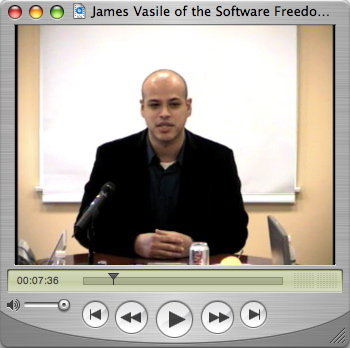
QuickTime Video
This past Tuesday, the Berkman Luncheon Series continued with a presentation and discussion by James Vasile of the Software Freedom Law Center.
James is Counsel for the center, which seeks to “provide legal representation and other law-related services to protect and advance free software.” In addition to his vast experience in a range of new media related cases, James has also contributed code and documentation to numerous FOSS software projects.
Runtime: 50:30, size: 320×240, 142MB, .MOV, H.264 codec
October 5th, 2007

QuickTime Video
Not too long ago, a student was escorted out of the Harvard University Bookstore (The Coop) for copying ISBNs from course materials only available at that store. The Coop claimed that the student was infringing on their “intellectual property,” because they were going to be used on the Crimson Reading website, which allows students to compare prices of course materials available online.
Clinical student Angela Kang and the Berkman Center’s John Palfrey and Wendy Seltzer joined together in noting the unfounded claims of The Coop in a recent Op-Ed published by The Harvard Crimson:
We’re not sure what “intellectual property” right the Coop has in mind, but it’s none that we recognize. Nor is it one that promotes the progress of science and useful arts, as copyright is intended to do. While intellectual property may have become the fashionable threat of late, even in the wake of the Recording Industry Association of America’s mass litigation campaign the catch-phrase—and the law—has its limits.
Now Berkman TV, the new video production channel from the Berkman Center, has an episode featuring Angela and Wendy, as they elaborate on this argument and the trends in intellectual property claims. Visit MediaBerkman for this episode of Berkman TV and the many more to come!
About
Berkman.tv is a frequently produced video segment on internet-related news and hot button issues with comments from Berkman fellows, faculty, and friends. Berkman.tv will explore a broad spectrum of issues, including, but not limited to, the future of the internet, copyright, net neutrality, intellectual property, public radio, and more. Keep an eye out on this space for more informed commentary from the Berkman Center for Internet & Society at Harvard Law School.
October 4th, 2007
 This afternoon Michael Maier, former Shorenstein Fellow and founder and CEO of the German company Blogform Publishing, joined the Berkman Luncheon Series to present on the next generation of digital media platforms in his talk: “Participation, Design, Search: How the Internet is Transforming.”
This afternoon Michael Maier, former Shorenstein Fellow and founder and CEO of the German company Blogform Publishing, joined the Berkman Luncheon Series to present on the next generation of digital media platforms in his talk: “Participation, Design, Search: How the Internet is Transforming.”
 Download the MP3 (time: 1:02:48)
Download the MP3 (time: 1:02:48)
Michael’s thoughts centered on the idea that digital magazines are starting to pick up, by bringing editorial structure and integrated publishing. Search will not remain Google’s monopoly. The Internet is transforming from an experimental space to a quite mature and professional platform. The next generation (which is today’s) of innovation will introduce more sustainable models and hence change the old media much more than the shockwaves of Web 1.0.
September 25th, 2007
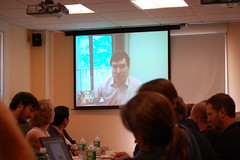
“JZ, live on the big screen, Future of the Internet Luncheon“
In the spirit of One Web Day, a celebration of global online life taking place on September 22nd, as well as Berkman’s 10th anniversary, we dedicated our luncheon series last week to a discussion on “The Future of the Net.”
 Download the MP3 (time: 1:05:20)
Download the MP3 (time: 1:05:20)
In a packed house, four Berkman Faculty/Fellows talked about their visions of the Net 10 years from now. Presenters included: MIT Media Lab professor Judith Donath, CALI fellow Gene Koo, visiting assistant professor at Northeastern School of Law Wendy Seltzer, and Berkman co-founder Jonathan Zittrain.
September 24th, 2007
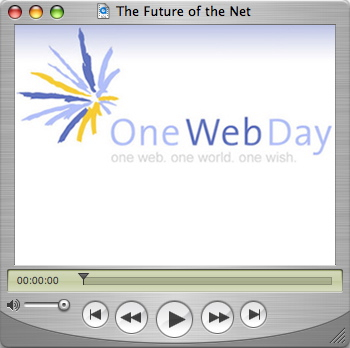
QuickTime Video
In the spirit of One Web Day, a celebration of global online life taking place on September 22nd, as well as Berkman’s 10th anniversary, we dedicated today’s luncheon series to a discussion on “The Future of the Net.”
In a packed house, four Berkman Faculty/Fellows talked about their visions of the Net 10 years from now. Presenters included: MIT Media Lab professor Judith Donath, CALI fellow Gene Koo, visiting assistant professor at Northeastern School of Law Wendy Seltzer, and Berkman co-founder Jonathan Zittrain.
Produced by Leah Weinberger.
Runtime: 59:42 , size: 320×240, 86MB, .MOV, H.264 codec
September 21st, 2007
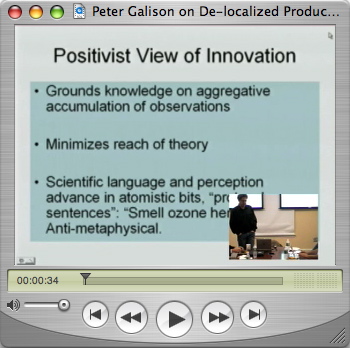
QuickTime Video
The Berkman Center kicked off this year’s Luncheon Series on Tuesday, September 11 with a stimulating presentation from world renowned physicist and professor at Harvard’s Department of the History of Science, Peter Galison.
Peter is the Joseph Pellegrino University Professor at Harvard University, a MacArthur Fellow, and spoke on his work around the de-localized production of scientific knowledge–on the ways in which “trading zones” form at the boundary between different scientific languages and practices.
Peter summarized the kind of work he has done on contemporary, massive, spatially dispersed collaborations in physics experiments, and more recent work on the early telegraph networks that so shaped the early formulation of relativity theory.
Runtime: 1:03:34 , size: 320×240, 185MB, .MP4, H.264 codec
September 21st, 2007
Next Posts
Previous Posts

 The Berkman Luncheon Series continued yesterday with Oliver Goodenough, who, in addition to being a Berkman fellow, is a Professor of Law at Vermont Law School and an Adjunct Professor at the Thayer School of Engineering at Dartmouth College.
The Berkman Luncheon Series continued yesterday with Oliver Goodenough, who, in addition to being a Berkman fellow, is a Professor of Law at Vermont Law School and an Adjunct Professor at the Thayer School of Engineering at Dartmouth College.
 Drew Clark
Drew Clark

 This afternoon Michael Maier,
This afternoon Michael Maier, 


